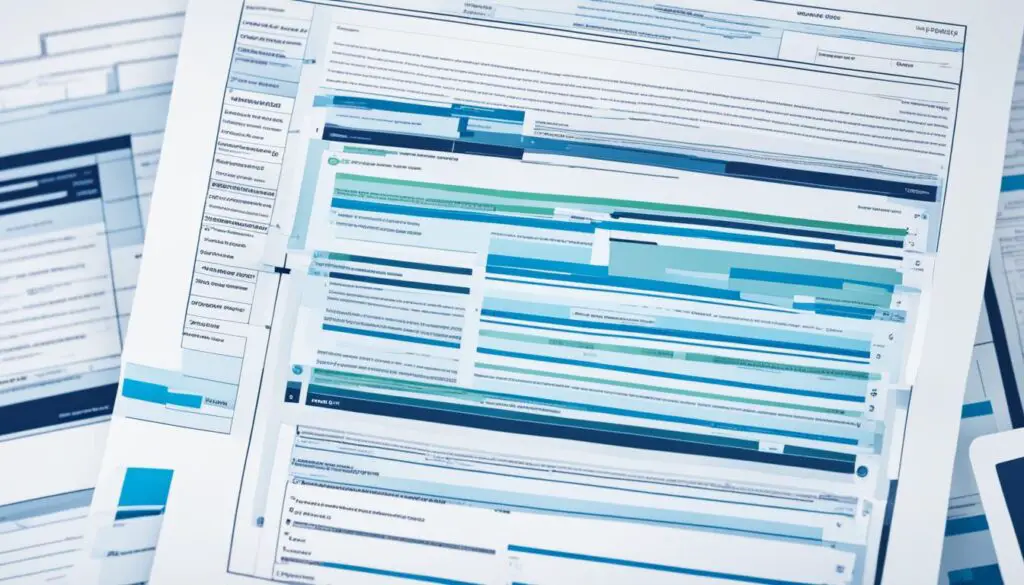
Smart legal documents are transforming the way legal processes are conducted. Through the use of advanced technology, these documents automate tasks, increase efficiency, and improve accuracy in the legal industry. By incorporating features such as intelligent data extraction, dynamic clauses, and automated workflows, smart legal documents streamline the creation, review, and management of legal documents. Gone are the days of tedious manual data entry and the risk of errors. With smart legal documents, legal professionals can streamline their workflows and ensure compliance with legal requirements.
Key Takeaways:
- Smart legal documents automate tasks, increase efficiency, and improve accuracy in the legal industry.
- They utilize features such as intelligent data extraction, dynamic clauses, and automated workflows.
- Smart legal documents eliminate the need for manual data entry and minimize errors.
- They streamline the creation, review, and management of legal documents, ensuring compliance with legal requirements.
- With smart legal documents, legal professionals can save time and enhance collaboration.
The Benefits of Smart Legal Documents
Smart legal documents offer numerous benefits to legal professionals and organizations. These advanced documents utilize cutting-edge technology to revolutionize the legal industry, providing time-saving and cost-effective solutions.
One of the key advantages of smart legal documents is their ability to automate repetitive tasks. By automating tasks such as contract drafting and document review, lawyers can save significant amounts of time. This allows them to focus on more strategic and complex legal matters, ultimately improving productivity and efficiency.
Moreover, smart legal documents are cost-effective. By reducing the need for extensive manual work, these documents can significantly decrease operational costs. Furthermore, the automation of document creation minimizes the risk of errors or omissions that could lead to costly legal disputes, saving organizations from potential financial burdens.
In addition to saving time and money, smart legal documents also improve accuracy and consistency. By applying predefined templates and standardized language, these documents ensure that legal documents are consistent across the board. This not only enhances professionalism but also reduces the likelihood of errors or variations that could impact legal outcomes.
Furthermore, smart legal documents ensure compliance with legal regulations and internal policies. By integrating legal requirements into the document automation process, these documents mitigate legal risks for organizations. They help to avoid non-compliance issues and maintain alignment with regulatory standards.
Overall, the benefits of smart legal documents are undeniable. They save time, reduce costs, improve accuracy, and ensure legal compliance. With their time-saving and cost-effective features, smart legal documents are transforming the legal industry, empowering legal professionals and organizations to streamline processes and enhance efficiency.
Testimonial: Streamlining Legal Processes with Smart Legal Documents
“Implementing smart legal documents has been a game-changer for our law firm. The time-saving and cost-effective features have allowed us to handle more cases efficiently and provide better services to our clients. Our productivity has increased significantly, and we can confidently say that smart legal documents have transformed the way we work.”
– Jane Smith, Partner at Smith & Associates
How Smart Legal Documents Work
Smart legal documents leverage the power of artificial intelligence (AI) and machine learning to revolutionize the way legal processes are conducted. By incorporating advanced technologies, these documents offer increased efficiency, accuracy, and automation in the legal industry.
One of the key components of smart legal documents is their ability to analyze and extract relevant data from various sources such as contracts, legal databases, and case law. Using sophisticated algorithms, these documents can automatically identify important information, eliminating the need for manual data entry and speeding up the document creation process.
Through the integration of machine learning algorithms, smart legal documents continually improve their accuracy and efficiency over time. These algorithms learn from user interactions and feedback, allowing the documents to adapt and evolve based on real-world usage. By harnessing machine learning, smart legal documents can better understand context, identify patterns, and generate intelligent insights for legal professionals.
The working of smart legal documents can be summarized as follows:
- Utilizing artificial intelligence and machine learning technologies to enhance functionality.
- Analyzing and extracting relevant data from various sources using advanced algorithms.
- Automating the document creation process by eliminating manual data entry.
- Incorporating machine learning algorithms to continually improve accuracy and efficiency.
- Adapting and evolving based on user interactions and feedback.
- Understanding context, identifying patterns, and generating intelligent insights for legal professionals.
By streamlining legal processes and leveraging the power of AI and machine learning, smart legal documents are transforming the way legal professionals work. They enable greater efficiency, accuracy, and collaboration, ultimately enhancing the overall legal experience.
Conclusion
Smart legal documents are transforming the legal industry by revolutionizing the way legal processes are conducted. By automating tasks, increasing efficiency, and improving accuracy, these documents streamline the creation, review, and management of legal documents.
With features such as intelligent data extraction, dynamic clauses, and automated workflows, smart legal documents offer numerous benefits including time-saving, cost-effectiveness, improved accuracy, and compliance with legal requirements.
Utilizing artificial intelligence and machine learning technologies, smart legal documents continually enhance their functionality and performance. As the technology continues to advance, these documents will play an increasingly crucial role in the legal profession, enabling legal professionals to embrace the future of document automation.
FAQ
What are smart legal documents?
Smart legal documents are advanced technology-driven documents that automate tasks, increase efficiency, and improve accuracy in the legal industry. They incorporate intelligent data extraction, dynamic clauses, and automated workflows to streamline the creation, review, and management of legal documents.
How do smart legal documents save time?
Smart legal documents save time by automating repetitive tasks such as contract drafting and document review. This allows lawyers to focus on more strategic and complex legal matters.
Are smart legal documents cost-effective?
Yes, smart legal documents are cost-effective. They reduce the need for extensive manual work and minimize the risk of errors or omissions that could lead to costly legal disputes.
How do smart legal documents improve accuracy?
Smart legal documents improve accuracy by applying predefined templates and standardized language. They also ensure compliance with legal regulations and internal policies, mitigating legal risks for organizations.
What technologies do smart legal documents leverage?
Smart legal documents leverage artificial intelligence and machine learning technologies. They utilize algorithms to analyze and extract relevant data from various sources such as contracts, legal databases, and case law. They also incorporate machine learning algorithms to continually improve their accuracy and efficiency.
How do smart legal documents evolve over time?
Smart legal documents evolve over time by utilizing machine learning algorithms. These algorithms learn from user interactions and feedback, allowing the documents to adapt and improve their performance.










